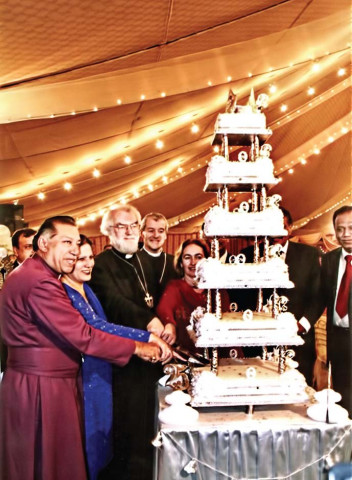Let them eat cake: Aitchison, the Archbishop and Mohkamuddin
‘He was the first person selling baked goods in Lahore’.

Let them eat cake: Aitchison, the Archbishop and Mohkamuddin
A small shop with an inconspicuous facade, Mohkamuddin Bakers is easy to miss. The shelves are half-empty, the choice extremely limited, and the prices high. Yet every 10 minutes, one or two customers come in and buy something.
Established in 1879 close to Anarkali, not much has changed about the bakery. It produces four types of traditional biscuits (finger, almond, sugar-free and soji), three types of patties (vegetable, chicken and plain), and cakes to order.
Even the customers haven’t changed much. “Seventy per cent of our clients now are children or grandchildren of people who also bought cakes from us,” says Mohkam Naqvi, 49, who runs the bakery like his father, Khushbakht Hussain, and grandfather, Syed Mohkamuddin, before him. “Sometimes we get foreigners who were told to come here by old customers who later moved abroad.”
According to Naqvi, the secret to keeping the customers returning is to keep things fresh and give them what they want. “We replace items on the shelves every four hours,” he says. “Be honest about how fresh the stuff is, or tell them to come another day. They will. Also, never argue over money.”
The bakery has followed traditional recipes, but is always willing to alter them to the customer’s satisfaction. Lawrence Harrison is a third-generation client of Mohkamuddin. For his daughter’s wedding, he says he sampled several recipes over a period of four months to get the perfect cake.
Cakes for special occasions are a Mohkamuddin specialty. Their Christmas cake is the oldest and most famous in Lahore. And there are really special occasions. Under Khushbakht Hussain, the bakery produced two 1,000-lb rich plum cakes, in 1953 and in the mid 1980s.
In 2005, Naqvi and his brother Muhammad Shajjar Naqvi went even further, making a 1,500-lb rich plum cake, a bakery specialty since 1879, for the visit of Archbishop of Canterbury Dr Rowan Williams to Lahore. “Bishop Alexander Malik was in charge of the event and he wanted something big.”
Mohkamuddin also still does a heart sugar cake, sponge cake and mousse cake that date back many years, but tastes have changed somewhat.
“Demand for the old cakes has gone down, apart from the rich plum cake and the cocktail cake,” he says.
Flipping through a manual filled with pictures of cakes, Naqvi says the young demand new varieties all the time. At the moment, the bakery has 5,000 recipes for cakes.
From Lady Aitchison’s kitchen
The enterprising Mohkamuddin learned how to bake biscuits and cakes from the British and then sold them to them. “My grandfather used to work for Lady Aitchison and she taught him to bake in the early 1870s,” says Naqvi.
In 1879, Mohkamuddin bought a 2-marla plot for Rs1.25 to set up the bakery, he says. His clients were mostly the British, bureaucrats and the elite, but he also made an effort to get ordinary citizens as customers.
“He was the first person selling baked goods such as biscuits, patties, pastries and cakes in Lahore. He would stock a basket and walk around the Old City, handing out free samples to passers-by,” says Naqvi.
In 1890, the Anglophile Mohkamuddin came up with the bakery’s top selling product: the finger biscuit. “Lady Harrison, an English woman, was my grandfather’s most regular client in the early 1890s. He always complimented her on her long, delicate fingers.”
Another big client was Lala Dhani Ram, a trader who Dhani Ram Road is named after. “My grandfather had special items baked for him,” Naqvi says.
Mohkamuddin passed away in 1947, leaving the business to his two sons including Naqvi’s father Khushbakht Hussain. “He spent up to ten hours every day at the shop until his death in 1995. He could stand outside the bakery and smell if the biscuits on the shelves were going stale.”
Published in The Express Tribune, June 27th, 2011.


















COMMENTS
Comments are moderated and generally will be posted if they are on-topic and not abusive.
For more information, please see our Comments FAQ